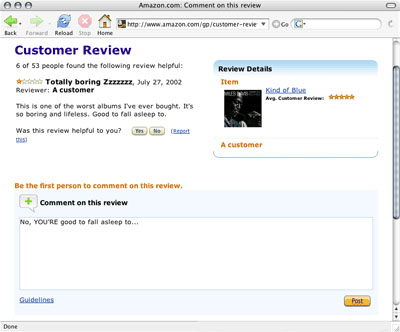-
Paul Turner (the guy who runs the art house theater in Corvallis) finally moved his weekly commentary to a blog instead of email.
community
-
Turn any Greasemonkey script into a full-on Firefox extension (Add-On). [via Spun]
-
Doug Kaye's latest venture.
-
Jon Udell on public-service podcasting. Excellent ideas here. "This isn't podcasting to build audiences and 'monetize' downloads. It's podcasting to expand access to public discussion."
-
[via sterling]
-
Gary McGraw: "People keep asking me to join the LinkedIn network," he said, "but I'm already part of a network, it's called the Internet." Jon's right, we can think bigger than our current data islands. [via o'reilly radar]
-
danah starts a discussion about virtual walled gardens, gated communities, whatever you want to call them. Be sure to check out the comments. The central question to me is: "who owns the walls?"
-
Anil shows some reasons why Ask Metafilter works and why Google Answers didn't.
-
New culinary site by Megnut, Apperceptive, and the rest! "Serious Eats, the first website for serious eaters, consists of video, blogs, photos, and feature stories and all geared toward the foods people love."
-
BBC series documenting the birth of psychological advertising, public relations, and the "manufactured consent" of the dangerous crowd. [via galbraith]
-
could be titled--everything you need to know about parenting you can learn from HTTP response codes. [via nelson]
-
You can use this tool to create a search engine limited to specific sites. [via superpatron]
-
a hyperlocal blog/news aggregator headed by Steven Johnson [via kottke], with some thoughts about the project from SBJ: Introducing outside.in.
Amazon Adds Comments
Just noticed that Amazon is now allowing comments on each review. It looks like this:

For years, Amazon has tried to keep people from having conversations via reviews with careful instructions about not referencing other reviews. But that didn't stop people from conversing. You often see things like, "Reviewer x is off his rocker..." or "I don't know what some of these reviewers are thinking..." in Amazon reviews. Now people can talk to each other directly.
If people know that their reviews are "thread starters" rather than isolated posts, you could get more chatty reviews with open-ended questions designed to provoke discussion. You should also get more flame wars, more trolling, all of the standard online discussion problems. (Especially with an audience as large as Amazon's.) And how do you police comments on millions of reviews? Does each reviewer "own" the thread associated with the review? If so, shouldn't they be able to approve/edit comments on that review? Is it fair to allow comments on a review from six years ago, when the author of that review isn't expecting feedback, and likely isn't tuning into the page anymore?
On the positive side, you might get a better view of a product because discussion can bring out more detail. Should be interesting.

(click to enlarge)
For years, Amazon has tried to keep people from having conversations via reviews with careful instructions about not referencing other reviews. But that didn't stop people from conversing. You often see things like, "Reviewer x is off his rocker..." or "I don't know what some of these reviewers are thinking..." in Amazon reviews. Now people can talk to each other directly.
If people know that their reviews are "thread starters" rather than isolated posts, you could get more chatty reviews with open-ended questions designed to provoke discussion. You should also get more flame wars, more trolling, all of the standard online discussion problems. (Especially with an audience as large as Amazon's.) And how do you police comments on millions of reviews? Does each reviewer "own" the thread associated with the review? If so, shouldn't they be able to approve/edit comments on that review? Is it fair to allow comments on a review from six years ago, when the author of that review isn't expecting feedback, and likely isn't tuning into the page anymore?
On the positive side, you might get a better view of a product because discussion can bring out more detail. Should be interesting.